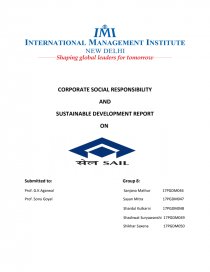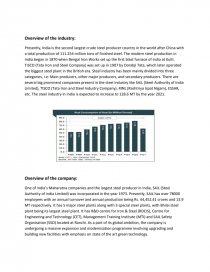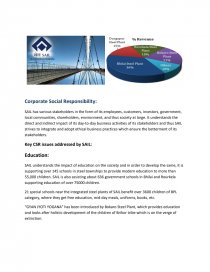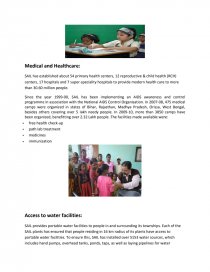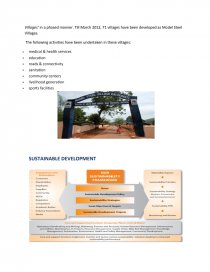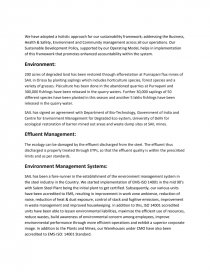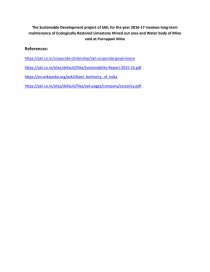Tata Iron and Steel Company
Essay by Shikhar Saxena • February 27, 2018 • Research Paper • 1,869 Words (8 Pages) • 1,076 Views
[pic 1]
CORPORATE SOCIAL RESPONSIBILITY
AND
SUSTAINABLE DEVELOPMENT REPORT
ON
[pic 2]
Submitted to: Group 8:
Prof. G.K Agarwal Sanjana Mathur 17PGDM046
Prof. Sonu Goyal Sayan Mitra 17PGDM047
Shardul Kulkarni 17PGDM048
Shashwat Suryawanshi 17PGDM049
Shikhar Saxena 17PGDM050
Overview of the industry:
Presently, India is the second largest crude steel producer country in the world after China with a total production of 111.254 million tons of finished steel. The modern steel production in India began in 1870 when Bengal Iron Works set up the first blast furnace of India at Kulti. TISCO (Tata Iron and Steel Company) was set up in 1907 by Dorabji Tata, which later operated the biggest steel plant in the British era. Steel industry has been mainly divided into three categories, i.e: Main producers, other major producers, and secondary producers. There are several big prominent companies present in the steel industry like SAIL (Steel Authority of India Limited), TISCO (Tata Iron and Steel Industry Company), RINL (Rashtriya Ispat Nigam), ESSAR, etc. The steel industry in India is expected to increase to 128.6 MT by the year 2021.
[pic 3]
Overview of the company:
One of India’s Maharatna companies and the largest steel producer in India, SAIL (Steel Authority of India Limited) was incorporated in the year 1973. Presently, SAIL has over 78000 employees with an annual turnover and annual production being Rs. 44,452.41 crores and 13.9 MT respectively. It has 5 major steel plants along with 3 special steel plants, with Bhilai steel plant being its largest steel plant. It has R&D centre for Iron & Steel (RDCIS), Centre for Engineering and Technology (CET), Management Training Institute (MTI) and SAIL Safety Organisation (SSO) located at Ranchi. As a part of its global ambition, the company is undergoing a massive expansion and modernisation programme involving upgrading and building new facilities with emphasis on state of the art green technology.
[pic 4][pic 5]
Corporate Social Responsibility:
SAIL has various stakeholders in the form of its employees, customers, investors, government, local communities, shareholders, environment, and thus society at large. It understands the direct and indirect impact of its day-to-day business activities of its stakeholders and thus SAIL strives to integrate and adopt ethical business practices which ensure the betterment of its stakeholders.
Key CSR issues addressed by SAIL:
Education:
SAIL understands the impact of education on the society and in order to develop the same, it is supporting over 145 schools in steel townships to provide modern education to more than 55,000 children. SAIL is also assisting about 636 government schools in Bhilai and Rourkela supporting education of over 75000 children.
21 special schools near the integrated steel plants of SAIL benefit over 3600 children of BPL category, where they get free education, mid-day meals, uniforms, books, etc.
“GYAN JYOTI YOGANA” has been introduced by Bokaro Steel Plant, which provides education and looks after holistic development of the children of Brihor tribe which is on the verge of extinction.
[pic 6]
Medical and Healthcare:
SAIL has established about 54 primary health centers, 12 reproductive & child health (RCH) centers, 17 hospitals and 7 super-speciality hospitals to provide modern health care to more than 30.60 million people.
Since the year 1999-00, SAIL has been implementing an AIDS awareness and control programme in association with the National AIDS Control Organisation. In 2007-08, 475 medical camps were organized in states of Bihar, Rajasthan, Madhya Pradesh, Orissa, West Bengal, besides others covering over 5 lakh needy people. In 2009-10, more than 3850 camps have been organized, benefitting over 2.32 Lakh people .The facilities made available were:
- free health check-up
- path lab treatment
- medicines
- immunization
[pic 7]
Access to water facilities:
SAIL provides portable water facilities to people in and surrounding its townships. Each of the SAIL plants has ensured that people residing in 16 km radius of its plants have access to portable water facilities. To ensure this, SAIL has installed over 5153 water sources, which includes hand pumps, overhead tanks, ponds, taps, as well as laying pipelines for water transportation. By such measures, SAIL has provided portable water facilities to over 38 lakh people in the country.
...
...
